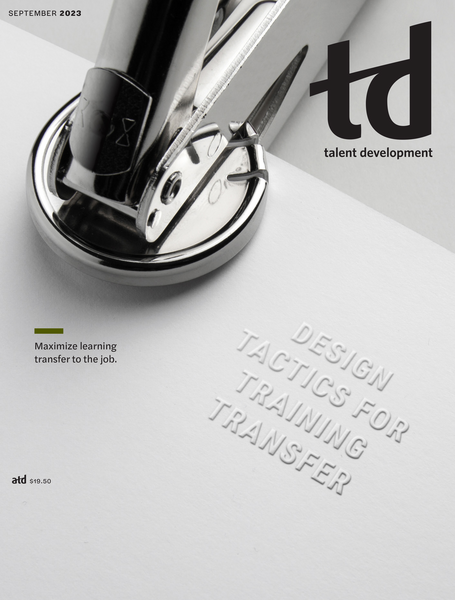TD Magazine Article
Recognize Collegial Support Equitably
Men are more highly regarded than women for the support they provide.
Fri Sep 01 2023

Men are more highly regarded than women for the support they provide.
Many studies have pointed to the importance of having supportive relationships at work: Gallup, for example, ties support to engagement, while a report from UK-based Wildgoose indicates a best friend at work makes the job more enjoyable—57 percent more—and increases productivity.
In their MIT Sloan Management Review article, "The Unequal Rewards of Peer Support at Work," Nancy Baym and Constance Noonan Hadley share highlights from their research analyzing social support behaviors men and women offered in the workplace during the pandemic. The authors found that companies are more likely to recognize men for their support of colleagues.
The disparity is important for several reasons. "While organizations continue to seek ways to better retain women and members of underrepresented groups, reduce the isolation with remote and hybrid work, and bolster job engagement and satisfaction, they should reexamine how they define, encourage, identify, and reward socially supportive behaviors at work," Baym says.
As the authors explain in their article, social support behaviors fall into five categories: emotional, esteem reinforcement, social companionship, informational, and instrumental.
The researchers asked respondents which types of support they have provided to colleagues during the past month. The study found that women most often offer emotional support, such as listening to others when they need to talk, as well as esteem support. Men more often provide social companionship, instrumental support, and offer career advice.
There's a correlation between the type of support offered and the workplace rewards that are bestowed. According to Baym and Hadley's article, the support that women offer may be less noticeable. Further, the types of support women offer may be valued less in the workplace than those that men offer, making for a lower rate of return on women's efforts.
"Organizations need to focus on social ROI for all employees. Every employee deserves a high return for investing effort in their workforce community, regardless of their demographic characteristics," advises Hadley. "Managers need to provide clarity about which behaviors count, make the invisible visible, provide training and education, and revise performance management systems."
You've Reached ATD Member-only Content
Become an ATD member to continue
Already a member?Sign In

